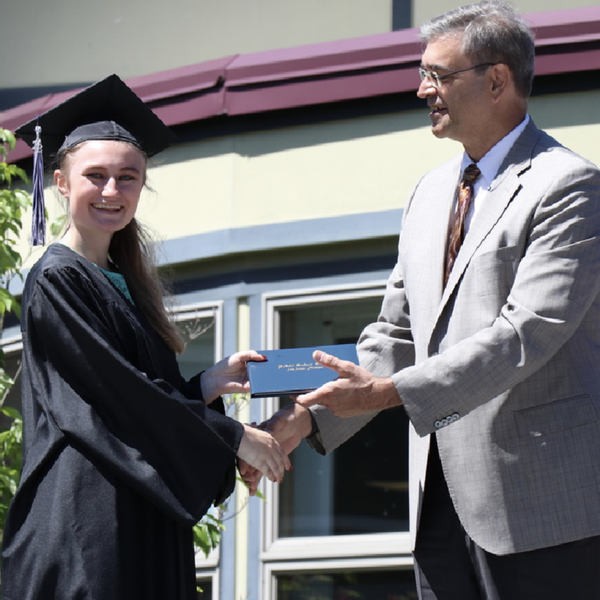

Waldorf Graduates Pursue Meaningful Careers

Will My Child Succeed After Waldorf High School? The Research Says Yes
Choosing a high school is a critical decision, and parents often wonder: Will this education prepare my child for college, career, and life?
For families considering Waldorf high schools, this question is especially relevant. With experiential learning, seminar-style discussions, and an interdisciplinary curriculum, can Waldorf truly equip students for fields like medicine, law, technology, and business?
Decades of research say yes.
Waldorf Graduates Excel in Higher Education and Careers
A 60-year study (Survey of Waldorf Graduates, Phase II, Mitchell & Gerwin, 2007) found that:
- 94% of Waldorf graduates attend college.
- 42% major in science-related fields—more than double the national average.
- Many earn advanced degrees in medicine, law, engineering, business, and the arts.
- Alumni thrive in fields ranging from finance and research to entrepreneurship and sustainability.
Waldorf Alumni Spotlight: Science in Action
After earning a degree in Earth Systems Engineering from the University of Michigan, Gavin Chensue ('06) joined the NOAA Commissioned Officer Corps, leading critical climate studies worldwide.
"Steiner education gave me a taste of everything. When I needed direction in college, I remembered how much I loved studying weather and geology—and that led me to where I am today." - Gavin Chensue (RSSAA '06), Research Engineer at SRI International, Former NOAA Corps Officer
His story highlights how Waldorf graduates succeed in STEM, combining curiosity and real-world problem-solving to make a global impact.
Read the full studies:
- Survey of Waldorf Graduates, Phase II: https://www.waldorfeducation.org/research
- Into the World Study: https://www.waldorfeducation.org/graduate-outcomes
What Makes a Waldorf Education So Effective?
Contrary to the belief that test-driven education leads to success, research shows that employers and universities highly value graduates who:
✔ Think critically and independently
✔ Communicate clearly and persuasively
✔ Collaborate effectively
✔ Solve complex problems
✔ Adapt to a changing world
These are precisely the skills Waldorf high schools cultivate.
1. Depth Over Memorization: Lifelong Knowledge Retention
Rather than rote memorization, Waldorf fosters deep understanding:
- History is explored through primary sources and narratives.
- Science emphasizes hands-on experiments and independent research.
- Mathematics focuses on real-world application.
- Literature and philosophy encourage analytical discussions.
One employer noted:
“Waldorf students don’t just look for the right answer—they explore the why and how behind complex issues.”
2. Seminar-Style Learning Develops Exceptional Communicators
Waldorf emphasizes oral presentations, debates, and collaborative discussions, preparing graduates for leadership roles in law, finance, business, and medicine.
Dr. Ilan Safit, co-author of *Into the World*, states:
“We consistently hear that Waldorf graduates excel at teamwork and leadership. Their ability to articulate complex ideas is a major asset.”
A study from Da Vinci Waldorf School found that Waldorf students select careers based on values and passion rather than prestige or income.
Final Thoughts: The Research Speaks for Itself
Professors and employers highlight Waldorf graduates’ intellectual curiosity and ability to think independently.
With strong college attendance rates, success across multiple professions, and the skills needed to navigate a complex world, one thing is clear:
Waldorf graduates don’t just succeed—they thrive.
Professors and employers highlight Waldorf graduates’ intellectual curiosity and ability to think independently.
With strong college attendance rates, success across multiple professions, and the skills needed to navigate a complex world, one thing is clear:
Waldorf graduates don’t just succeed—they thrive.
Read more on Waldorf Graduates
Selecting a High School

Selecting a High School
Advice from Veteran Waldorf Educators
Choosing the right high school can feel like one of the most significant decisions a family will make in their child’s educational journey.
To bring clarity to this decision, we turned to two of our most experienced educators at the Rudolf Steiner School of Ann Arbor: Margot Amrine, a longtime Waldorf teacher with over four decades of experience, and Dr. Siân Owen-Cruise, our former School Administrator, who has guided countless families through the high school selection process.
Today’s parents listen to and respect their children’s perspectives more than ever before- a positive shift in family dynamics. But as Margot reminds us, that doesn’t mean parents should surrender their leadership on big decisions.
“In our family we said that Waldorf Education for 9th and 10th grade was essential. At 11th grade, a different kind of maturity sets in; if our children had made compelling reasons to leave then, we would have considered. We never had these discussions!”
Dr. Owen-Cruise expands on this, acknowledging that social pressures play an outside role in an 8th Grader's thinking:
“It's natural for teenagers to focus on their peers and social dynamics when thinking about high school. As parents, we listen, we understand, and we take their feelings seriously- but ultimately, we need to lead this decision with wisdom and foresight.”
Dr. Owen-Cruise often frames the conversation with the rising student in the following way:
“Your parents will choose where you receive your high school education, with your input. YOU will choose where you go to college, with our parental input.”
Many families who have walked this path find that their children- whether they started in Waldorf Education or joined from another school-ultimately express gratitude that their parents guided this decision with their long-term development in mind.
Here are some other helpful tips and information when thinking about our own High School:
Waldorf Graduates Pursue Meaningful Careers
“Will My Child Succeed After Waldorf High School? The Research Says Yes” - Blog Article
Parents often ask: Does a Waldorf education prepare students for college, careers, and beyond? The answer is a resounding yes. Studies show that Waldorf graduates not only attend college at high rates but also excel in fields like science, medicine, law, and technology. Employers and universities consistently praise their ability to think critically, communicate effectively, and adapt to a changing world. Want to know why? This article dives into the research and real-world successes of our alumni.
The Joy of a Phone-Free School: How Our Students Thrive Without Screens
"The Joy of a Phone-Free School: How Our Students Thrive Without Screens" - Blog Article
In an age where screens dominate every aspect of life, imagine a school where students engage in real conversations, dive into hands-on projects, and focus fully in class—without the pull of notifications. Our phone-free policy isn’t just a rule; it’s a game-changer. See how it shapes our students’ social and academic lives!
